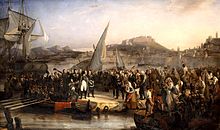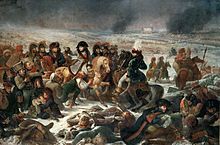Portal:Napoleonic Wars
• • • Napoleonic Wars • • •
| The Napoleonic Wars were a series of wars declared against Napoleon's French Empire by opposing coalitions that ran from 1803 to 1815. As a continuation of the wars sparked by the French Revolution of 1789, they revolutionised European armies and played out on an unprecedented scale, mainly due to the application of modern mass conscription. French power rose quickly as Napoleon's armies conquered much of Europe but collapsed rapidly after France's disastrous invasion of Russia in 1812. Napoleon's empire ultimately suffered complete military defeat resulting in the restoration of the Bourbon monarchy in France. The wars resulted in the dissolution of the Holy Roman Empire and sowed the seeds of nascent nationalism in Germany and Italy that would lead to the internal consolidation of both nations later in the century. Meanwhile, the global Spanish Empire began to unravel as French occupation of Spain weakened Spain's hold over its colonies, providing an opening for nationalist revolutions in Spanish America. As a direct result of the Napoleonic wars, the British Empire became the foremost world power for the next century, thus beginning Pax Britannica.
No consensus exists as to when the French Revolutionary Wars ended and the Napoleonic Wars began. An early candidate is 9 November 1799, when Bonaparte seized power in France with the coup of 18 Brumaire. 18 May 1803 is the most commonly used date, as this was when a renewed declaration of war between Britain and France (resulting from the collapse of the Treaty of Amiens), ended the only period of general peace in Europe between 1792 and 1814. The Napoleonic Wars ended following Napoleon's final defeat at Waterloo on 18 June 1815 and the Second Treaty of Paris. |

Napoleon leaving Elba, by Joseph Beaume, 1836
|
• • • Selected picture • • •
| Commissioned by Napoleon and painted by Jacques-Louis David between 1805–1807, measuring approx 10 m by 6 m the "Consecration of the Emperor Napoleon I and Coronation of the Empress Josephine in the Cathedral of Notre-Dame de Paris on 2 December 1804" displays Napoleon's inauguration in great detail. |
• • • Selected battle • • •
|
The Battle of Eylau or Battle of Preussisch-Eylau, 7 and 8 February 1807, was a bloody and inconclusive battle between Napoléon's Grande Armée and a Russian Empire army under Levin August, Count von Bennigsen near the town of Preußisch Eylau in East Prussia. Late in the battle, the Russians received a timely reinforcement from a Prussian division. The town is now called Bagrationovsk and it is a part of Kaliningrad Oblast, Russia. The engagement was fought during the War of the Fourth Coalition, part of the Napoleonic Wars.
Napoleon's armies previously smashed the army of the Austrian Empire in the Ulm Campaign and the combined Austrian and Russian armies at the Battle of Austerlitz on 2 December 1805. Austerlitz forced the Austrians to sue for peace and their Russian allies to withdraw from the conflict. On 14 October 1806, Napoleon crushed the armies of the Kingdom of Prussia at the Battle of Jena-Auerstedt. After a rapid pursuit, the broken pieces of the Prussian army were destroyed at the Battles of Prenzlau and Lübeck and in a series of capitulations at Erfurt, Pasewalk, Stettin, Magdeburg, and Hamelin. Eylau was the first serious check to the Grande Armée and the myth of Napoleon's invincibility was badly shaken. In late January, Bennigsen's Russian army went on the offensive in East Prussia, pushing far to the west. Napoleon reacted by mounting a counter-offensive to the north, hoping to prevent their retreat to the east. After his cossacks captured a copy of Napoleon's orders, Bennigsen rapidly withdrew to the north-east to avoid being cut off. The French pursued for several days and found the Russians drawn up for battle at Eylau. In a vicious evening clash, the French captured the village with heavy losses on both sides. The following day brought even more serious fighting. Early in the battle, a frontal attack by Napoleon failed with catastrophic losses. To retrieve the situation, the emperor launched a massed cavalry charge against the Russians. This bought enough time for the French right wing to throw its weight into the contest. Soon, the Russian left wing was bent back at an acute angle and Bennigsen's army was in danger of collapse. A Prussian corps belatedly arrived and saved the day by pushing back the French right wing. As darkness fell, a French corps tardily appeared on the French left flank. That night Bennigsen decided to retreat, leaving Napoleon in possession of a snowy battlefield covered with thousands of corpses and many more wounded. |
• • • Selected biography • • •
|
Gebhard Leberecht von Blücher, Fürst von Wahlstatt (December 16, 1742 – September 12, 1819), Graf (Count), later elevated to Fürst (Prince) von Wahlstatt, was a Prussian Generalfeldmarschall (field marshal) who led his army against Napoleon I at the Battle of the Nations at Leipzig in 1813 and at the Battle of Waterloo in 1815 with the Duke of Wellington.
He is honoured with a bust in the German Walhalla temple near Regensburg. The honorary citizen of Berlin, Hamburg and Rostock bore the nickname "Marschall Vorwärts" ("Marshal Forward") because of his approach to warfare. There was a German idiom, "ran wie Blücher" ("on it like Blücher"), meaning that someone is taking very direct and aggressive action, in war or otherwise. |
• • • Selected good articles • • •
• • • Did you know? • • •
![]() ... that after the Battle of Austerlitz in 1805, Napoleon predicted General Michel Ordener would die within five or six years – and although he retired, Ordener died in 1811?
... that after the Battle of Austerlitz in 1805, Napoleon predicted General Michel Ordener would die within five or six years – and although he retired, Ordener died in 1811?
![]() ... that the French stormed the Bagration flèches eight times during the Battle of Borodino in 1812?
... that the French stormed the Bagration flèches eight times during the Battle of Borodino in 1812?
![]() ... that Moustache, a French poodle, is said to have been awarded a medal by Marshal Jean Lannes for saving a regimental flag at the Battle of Austerlitz?
... that Moustache, a French poodle, is said to have been awarded a medal by Marshal Jean Lannes for saving a regimental flag at the Battle of Austerlitz?
• • • Categories • • •
• • • WikiProjects • • •
|
 |
• • • Related portals • • •
• • • Reading material • • •
• • • Featured articles • • •
• • • Related topics • • •
• • • Wikimedia • • •
| Napoleon I on Wikiquote | Napoleonic Wars on Commons | Napoleon Bonaparte on Wikisource | Napoleonic Europe on Wikibooks |
- What are portals?
- List of portals
- Featured portals






